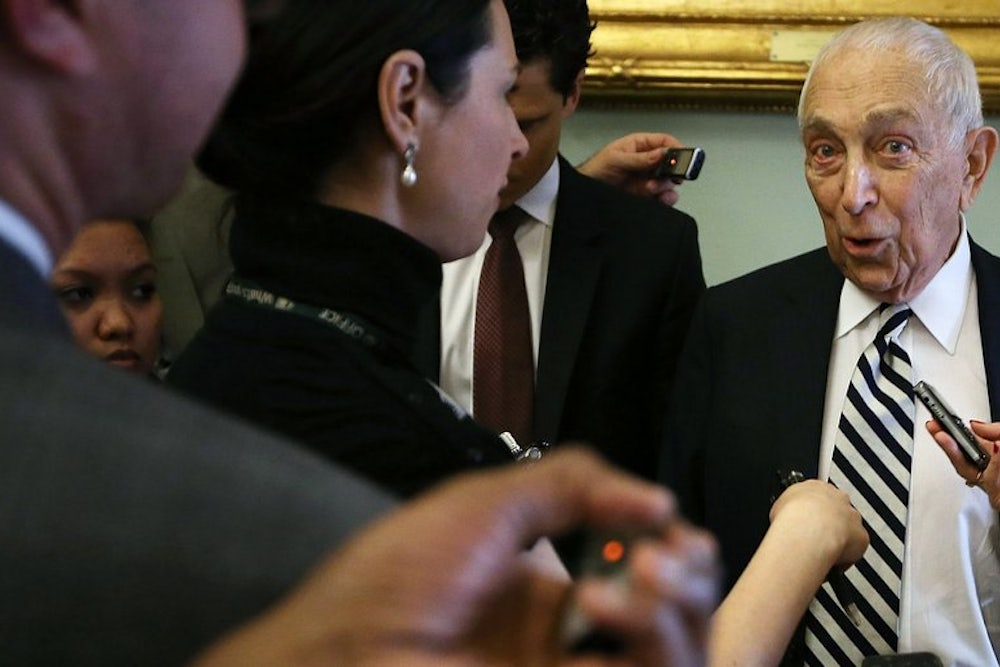The flags at the U.S. Capitol are flying at half-mast today, as Senator Frank Lautenberg of New Jersey died Monday morning at the age of 89. Lautenberg had already announced that he wouldn’t seek reelection in 2014, so the implications for composition of the Senate are modest: Newark Mayor Cory Booker is still favored to win the seat, but the two choices facing Governor Chris Christie—appointing Lautenberg's replacement, and deciding whether to hold a special election (and if so, when)—could create a few wrinkles in both the Senate race and the popular governor's own re-election bid this fall.
The timing of the Senate election is now in question. It's unclear, due to conflicting elements of state law, whether there must be an election in 2013. One provision states that if the vacancy occurs more than 70 days before the next general election (in November), then the election will be held in the next general election, or during a special election if the governor so chooses. Another provision, however, says that if the vacancy occurs less than 70 days before the primary, then the Senate election won’t be until 2014, unless the governor calls for a special election. Since we are more than 70 days before November’s general election, but less than 70 days before tomorrow’s primary, the law offers contradictory guidance. Initial reports suggested that the contest would occur no later than this November, since that provision was enacted most recently. Since then, the State Office of Legislative Services issued an opinion obtained by The Star-Ledger that the appointee would serve until November 2014, although the governor has the option of holding a special election. The Star Ledger article doesn't say whether the OLS opinion is binding. Legal challenges may be possible.
Regardless, Christie will have options. The law either requires an election in November 2013 or 2014, and it gives Christie the option of convening a special election. Regardless of whether the election is this year or next, there probably won’t be huge consequences for the outcome of the Senate race, with one possible twist: Steve Kornacki notes that if the special election is held on or before this November’s election, there might not be a primary and, instead, the state party committees would pick the candidates. It’s possible that the Democrats could snub Booker, who isn’t a favorite of party insiders. But Booker is the only Democrat to announce his candidacy for Senate, and he’s very popular—the committee would be hard pressed to deny him the nomination, tempting as that may be.
Given that Lautenberg had planned to retire, jockeying for his seat was already underway, with Booker the clear favorite. Frank Pallone, a well-connected congressman, was considering challenging him for the Democratic nomination, but Booker’s popularity and name-recognition would have been tough to overcome. Recent surveys showed Booker near 50 percent in a hypothetical primary, with challengers like Pallone struggling to reach 10 percent. In a general election, Booker is a heavy favorite. New Jersey’s Democratic lean is tough enough for Republican Senate candidates to overcome, but Booker’s popularity makes the challenge nearly insurmountable. A recent Quinnipiac survey showed Booker with a 59-11 favorability rating, including 57-8 among independents and 69-11 among voters making more than $100,000 per year—two groups essential to any Republican candidacy in a heavily Democratic, diverse state like New Jersey. The same poll showed Booker leading a Republican challenger by more than 30 points.
Barring a Booker snub by the state's Democratic Party, the date of the election is unlikely to change the outcome. A later election would give a Republican appointee more time to capitalize on the benefits of incumbency, but it's unlikely that a year and a half in the U.S. Senate will do wonders for a Republican’s popularity in New Jersey. If the election is held in November 2013, Christie’s coattails might help the GOP’s Senate candidate. On the other hand, Democrats tend to benefit from higher turnout, and a general election with two big races might draw more voters than a Senate election would on its own.
Gaming out Christie’s calculus is just as interesting as gaming out the potential consequences for the election. Christie is running for reelection this November, and it’s possible he’d err toward a special election or a 2014 election to avoid a simultaneous Senate election. That might seem surprising, since he will likely coast to reelection, but there’s a tenuous case that a concurrent Senate election could hurt his chances by unifying Democrats around his opponent or, more likely, boosting Democratic turnout. This only matters at the margins, if it matters at all, but there isn’t a clear reason why a concurrent senatorial contest helps Christie, so he might be tempted to exercise his authority to convene a special election on a different date or wait until November 2014, provided it didn’t unleash an unnecessary political controversy.
If there is an election this year, the new Senator will still need to run for reelection in 2014. That’s probably good news for Democrats. If special circumstances ultimately yield an unlikely Republican victory--perhaps if the party committee doesn’t select Booker—Democrats will be able to challenge the Republican nominee within one year, likely before they attain the full advantages of incumbency. If Booker wins the special election, he would be all but assured of winning reelection, so the additional election mainly allows Democrats to hedge against an unexpected outcome in 2013.
